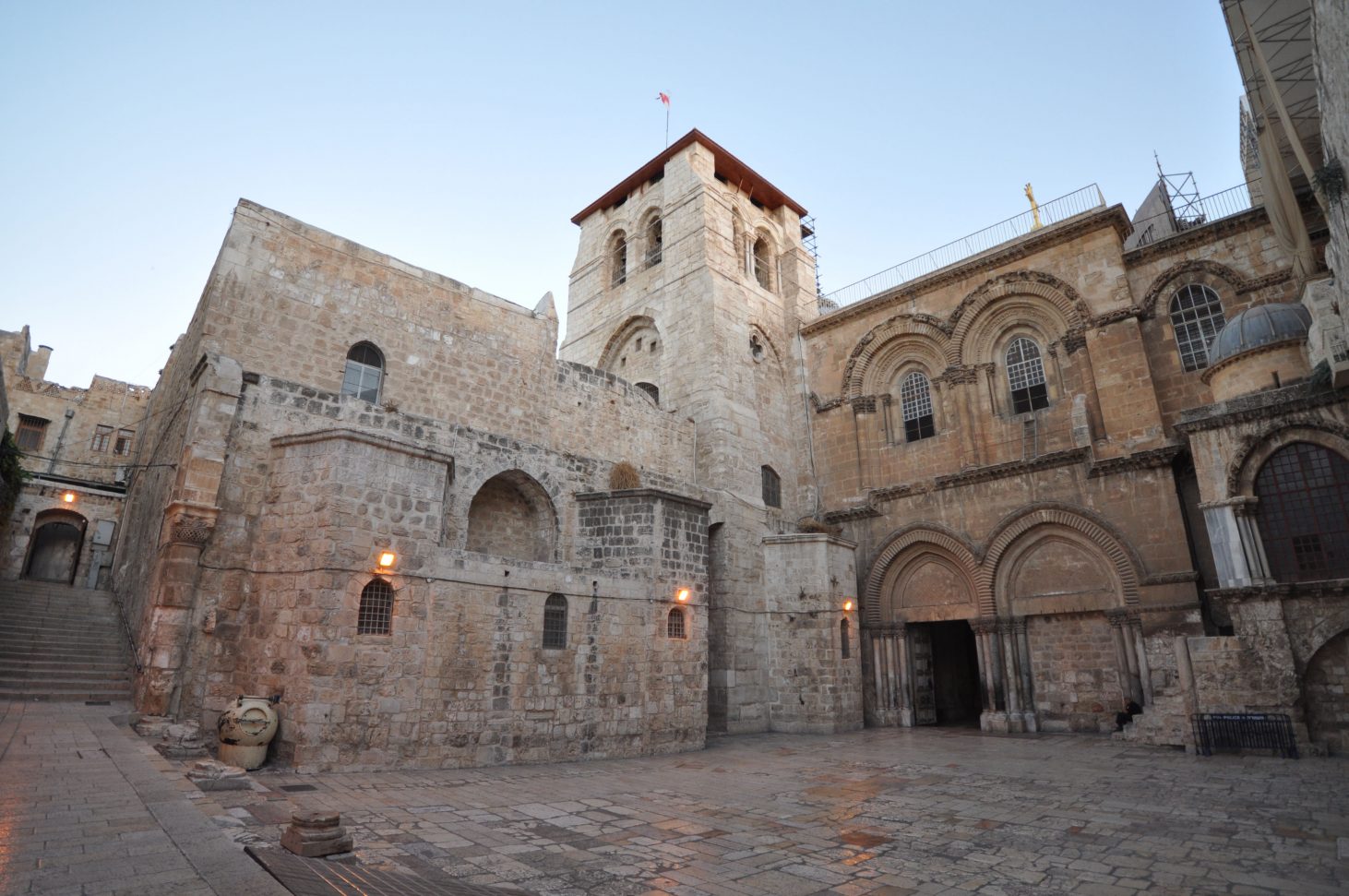Crises between the State of Israel and Christian institutions will continue to arise, unnecessarily, until Israel creates a central authority to manage a coordinated strategy regarding relations with Christians.
In February, three international Christian institutions – the Greek-Orthodox Patriarchate, the Catholic Custody of the Holy Land, and the Armenian Patriarchate – took the dramatic step of closing the Church of the Holy Sepulchre in the Old City of Jerusalem. This provocative move was designed to catch the attention of both Israeli decision-makers and international media in protest of policies proposed by the Jerusalem Municipality and a member of Knesset. The crisis, a result of internal pressures and political fights on both sides, was resolved by the intervention of Israeli Prime Minister Netanyahu, but not before damage was done to Israel’s reputation.
Church leaders were protesting two Israeli initiatives. The first was a plan by the Jerusalem Municipality to collect taxes from church commercial properties. The second was a private piece of legislation proposed in Knesset by Rachel Azaria MK (of the Kulanu Party, which is part of the governing coalition) that would allow the state to expropriate church lands that were leased by the Jewish National Fund and had recently been sold to private investors.
The churches portrayed the moves as part of a “systemic campaign of abuse against churches and Christians” and even hinted in an official statement that they were akin to anti-Jewish legislation “during dark periods in Europe.” The sentiment was picked up on by other Christian communities. The Lutheran Church of the Redeemer in the Old City shut its doors in solidarity. Some, like the Evangelical periodical Christianity Today and an Anglican college in Jerusalem, bizarrely tied the dispute to the US decision to recognize Jerusalem as Israel’s capital.
Of course, the crisis had nothing to do with an anti-Christian campaign or with President Donald Trump. It was the result of a complex convergence of factors, including a dispute between the Jerusalem Municipality and the Finance Ministry, financial troubles within the Greek Orthodox Church, and pressure on the Greek Orthodox Patriarch of Jerusalem to prove his pro-Palestinian bona fides to his local followers.
Indeed, the churches were truly concerned that the tax would bankrupt them. The Municipality’s decision to freeze the bank accounts of the indebted churches did nothing to ease the tensions.
Mayor Nir Barkat insinuated that the responsibility for solving the problem lay with Finance Minister Moshe Kahlon, with whom he was in a bitter public feud over state budgets for the municipality. “Either the state will compensate us and return the money that is meant to develop the city, or we will collect it as required by law,” Barkat said. (That dispute has now been settled).
On top of these pressures, the future of Jerusalem homes on leased church land is also a burning political issue. In 2017, the government appointed a legal team to work out a solution for lands sold by the churches. However, MK Azaria recognized the political benefit of taking up the worried residents’ cause, and she presented her private legislation – unhelpfully named “Church Lands Bill” – in the Knesset. Even though the bill never progressed even to a preparatory vote, she successfully branded herself as a fighter for Jerusalemites.
The stunt by the church leaders worked. Within days, Netanyahu announced that the tax collection and the expropriation bills would be frozen. He then appointed Regional Cooperation Minister Tsachi Hanegbi to head a commission to find a negotiated solution for the tax question.
Unfortunately, cooler heads prevailed only after a manageable disagreement erupted into a messy public fight that harmed Israel’s international image. This happens far too often when Israel and Christian organizations have disagreements over a range of issues.
In fact, there is a pattern here. A funding dispute between the Education Ministry and Christian schools in Israel in 2015 led to a strike by the schools. It even reached Pope Francis, who raised the issue with Israeli President Reuven Rivlin when he visited the Vatican. It too took the intervention of a minister and the creation of a committee to end the strike and bring everyone calmly back to the table.
Similar disputes will continue to surface. Israel and international churches have substantive disagreements on pressing topics – including delicate negotiations between Israel and the Vatican on a range of issues that have continued for a quarter century. Israel is making a strategic mistake by relying on ad-hoc solutions to de-escalate crises only after the problem threatens to spiral out of control.
Some might wonder why Christian affairs matter to Israel, given Israel’s more pressing national security and diplomatic issues. But like these other challenges, Israel’s policies toward international Christian institutions bear strategic importance for the country. Unfortunately, Israel has not managed to create government bodies and consistent policies to ensure that these matters are handled in anything close to an optimal way.
Public relations and politics are legitimate factors within a democratic system. Actors will use whatever means they possess to gain advantage in negotiations, including dramatic press stunts and bills that will obviously never pass. But when there is no dedicated body with the proper influence to quietly arbitrate inevitable conflicts, they escalate needlessly and cause damage to Israel on multiple fronts.
It is crucial that Israeli decision makers assimilate a fundamental reality, which is that the churches are not merely local religious organizations with prime real estate, and their leaders are not just clergy in interesting costumes. The churches are ancient, massive international organizations with the backing of powerful governments and access to seats of power. They influence hundreds of millions of believers around the globe. And in addition to their religious functions, church leaders are political actors who know how to play the game.
Though Western Europe has grown more secular, the rest of Europe has not, and citizens rally around churches as part of rising nationalist fervor. In Russia, for instance, the Orthodox Church has influence of almost a state religion. In Armenia, Greece, and Cyprus, the Church is part of the national identity. Catholic church is influential in Latin America and Africa. This is just a brief list.
Many church leaders would rather reach accommodations with Israeli authorities but contend that they have no central address in the halls of power with whom to negotiate.
There are certainly voices in the government that are aware of both the complexities and the importance of the issues, including the Department of World Religions in the Israel Ministry of Foreign Affairs. Alas, they do not wield real power. Moreover, the Ministry of Foreign Affairs, Ministry of Interior, Jerusalem Municipality, and Israel Police all conduct business with Christian institutions – but with very little coordination.
And without a deep understanding of the issues, and under pressure from far more powerful stakeholders within the Israeli system, Israeli decision makers regularly prioritize other interests — security, politics, and even public relations — over those of local Christians and the benefits of strategic cooperation with international churches.
Israel must recognize the importance of its policies toward Christian communities and churches, and this recognition must be given expression in the structure of Israeli government. A lone advisor without power is not sufficient. Rather, an office for Christian affairs, headed by experts fluent in both the Christian world and Israeli interests, should be created.
The office could sit independently within the Prime Minister’s Office, giving it the inter-departmental authority it needs to succeed. It must be granted authority to coordinate relations between the government – local and national – and the international Christian movements. It should be responsible for the creation of an Israeli long-term strategy regarding local and international Christian communities.
Moreover, the office should track and respond to anti-Jewish and anti-Israeli incitement originating from Church sources, which influences millions of people worldwide. Today, Israel often ignores such expressions, and shirks one of its missions as the Jewish state.
Putting aside recent media stunts by church leaders, it needs to be emphasized that, overall, Israel is a very safe home for Christians in today’s Middle East; a region from which they are being banished and in which often are being slaughtered. The fact that Christian churches dispute with Israel are over quotidian democratic issues, like tax and property rights, is a testament to this fact.
But tensions will continue to arise unless significant changes are made in the way Israel operates. It is imperative that Israel recognizes the strategic importance of its relations with Christian institutions. This is crucial for empowering the nation-state of Jews to become the leading player in and contributor to Jewish-Christian reconciliation worldwide, after thousands of years of hostilities. This will ultimately contribute to a better future for Jews, for Christians, and for the State of Israel.
ISS Policy Papers are published through the generosity of the Greg Rosshandler Family.
photo: By https://www.flickr.com/photos/jlascar/ [CC BY 2.0 ], via Wikimedia Commons










 - בניית אתרים
- בניית אתרים